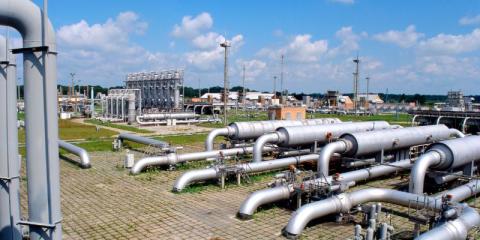Ukraine has long been at the center of a geopolitical tug-of-war between Russia and the West, and the country's energy sector has been a key battleground in this ongoing conflict. The latest chapter in this story revolves around Ukraine's gas supply, which has become a major point of contention between the country and its neighbors.
Ukraine is heavily reliant on gas imports, with more than half of its natural gas coming from Russia. This dependence has been a source of tension between the two countries for many years, with Russia often using gas prices as a political tool to pressure Ukraine.
In 2014, Russia annexed Crimea, a move that triggered a crisis in Ukraine and led to Western sanctions against Russia. As part of this conflict, Russia also cut off gas supplies to Ukraine, leading to energy shortages and price hikes. In response, Ukraine began to diversify its energy sources and reduce its dependence on Russia.
The latest gas dispute between Ukraine and Russia began in late 2021, when Russia refused to renew a gas transit agreement with Ukraine. The previous agreement, which was signed in 2019, allowed Russian gas to be transported to Europe via Ukraine's pipelines. Without a new agreement, Ukraine's gas transit revenues would be at risk, and Europe's energy security could be jeopardized.
In response to the threat, Ukraine has sought to increase its own gas reserves and find alternative suppliers. The country has increased its gas imports from Europe and signed a new agreement with Hungary to increase gas supplies from that country.
At the same time, Russia has continued to push for the completion of the Nord Stream 2 pipeline, which would bypass Ukraine and transport gas directly to Europe via the Baltic Sea. This move would reduce Europe's dependence on Ukraine's gas transit infrastructure and increase Russia's leverage over its neighbors
The gas dispute between Ukraine and Russia has significant implications for both countries and the wider region. For Ukraine, the loss of gas transit revenues could have a major economic impact, while increased gas prices could further strain the country's already fragile economy. At the same time, Ukraine's efforts to reduce its dependence on Russian gas could lead to a more stable and diversified energy sector.
For Russia, the dispute is part of a broader effort to maintain its dominance over the region and maintain control over its energy exports. The completion of the Nord Stream 2 pipeline would give Russia a major advantage in this regard, allowing it to bypass Ukraine and increase its leverage over Europe's energy security.
For Europe, the dispute highlights the need for a more diversified and secure energy supply. The ongoing conflict between Ukraine and Russia has already led to energy shortages and price spikes in the past, and the completion of the Nord Stream 2 pipeline could make the situation even more volatile.
The gas dispute between Ukraine and Russia is a complex issue with far-reaching implications. While Ukraine's efforts to reduce its dependence on Russian gas are a positive step, the country still faces significant challenges in maintaining its energy security. At the same time, Russia's push for the completion of the Nord Stream 2 pipeline highlights the country's determination to maintain its dominance over the region. As the situation continues to evolve, it will be important for all parties to work together to ensure a stable and secure energy supply for the region.





